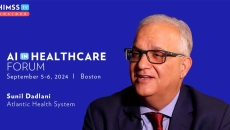Artificial Intelligence
AI & ML Intelligence
In a market filled with point source solutions, digital health leaders say decision-makers must cut through noise and hype to architect change management and manage costly technology.
Hippocratic AI and Adtalem’s Chamberlain University and Walden University will develop a certification program for nurses to evaluate and assess AI use in healthcare.
AlphaProteo was created to advance drug design and disease understanding by helping researchers configure high-strength proteins that bind to molecules.
AI & ML Intelligence
The accountable care organization has achieved a 10% improvement in quality gap closure, a key measure of network performance that will deliver $1 million in potential incentive payments.
Atlantic Health System Chief Information & Digital Officer Sunil Dadlani explains how AI and security "aren't mutually exclusive, they're mutually inclusive."
At Omaha-based CHI Health, a hybrid cloud platform supported stroke patient care after the worldwide IT disruption knocked out its electronic health records, says one neurologist who recounts the experience.
Dr. Traci Granston, medical director at Cohere, describes how information is extracted in real time, speeding the process to approve or to ensure medical necessity is met.
In a preview of the upcoming HIMSS Healthcare Cybersecurity Forum, Lee Kim, senior principal for cybersecurity and privacy at HIMSS, discusses the responsible use of artificial intelligence in healthcare.
At a pivotal moment for artificial intelligence innovation, HIMSS Adoption Models can help healthcare organizations get onboard and scale up, says Hal Wolf, CEO of HIMSS.
AI & ML Intelligence
David Heaney, chief information security officer at Mass General Brigham, explains how genAI can help his team learn and protect. He also discusses best practices for securing data with – and against – AI.









